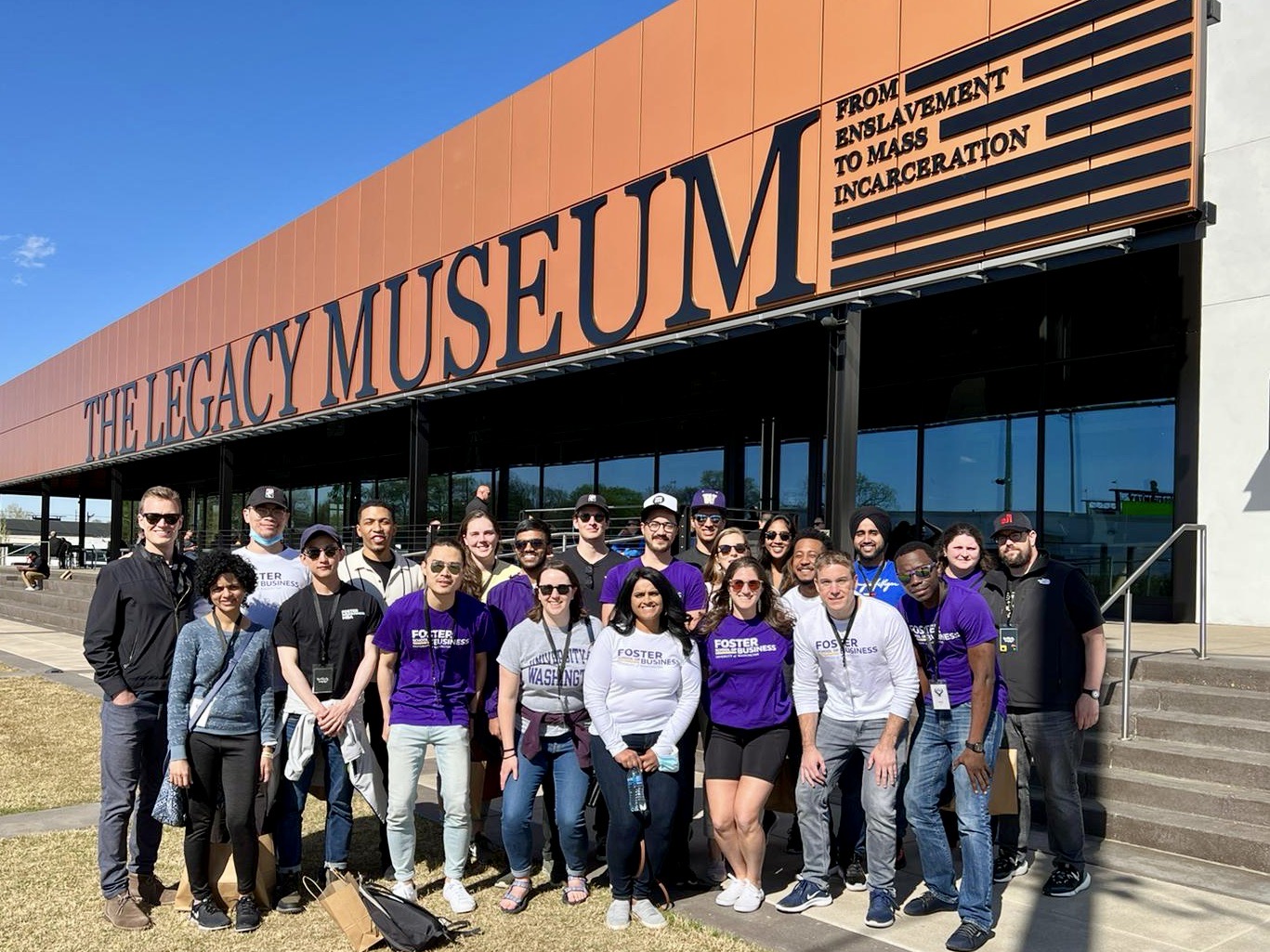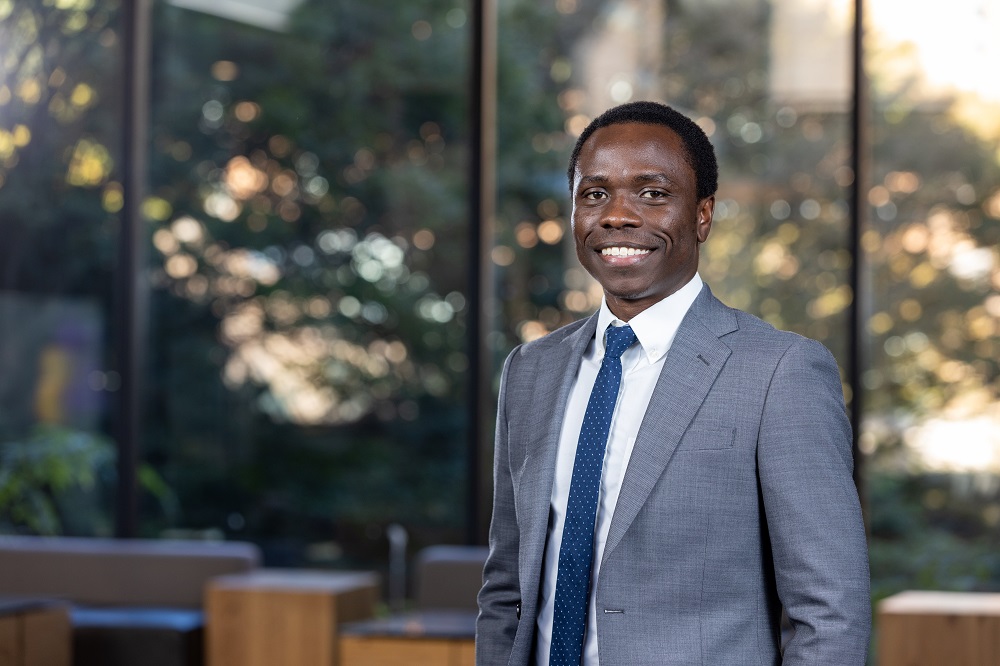Bob Agiro uses his African American Heritage Endowed MBA Scholarship to build career and community
Bob Agiro, a member of the Foster School Evening MBA class of 2023, is this year’s recipient of the African American Heritage Endowed MBA Scholarship. After earning a degree from the College of Aviation at Western Michigan University and working at Southwest Airlines, he shifted course to join Pfizer before earning a master’s degree in systems engineering at Kennesaw State University. Now, while working to advance aircraft reliability at The Boeing Company as he finishes his Foster MBA, he engages other Black and minority engineers through affinity groups that encourage growth and advancement. Bob is among those who will be recognized for their accomplishments at the 20th Celebration of African American Alumni Achievement on February 28, 2023. Kristin Anderson, Foster’s associate director of stakeholder communications and relations, sat down with Bob ahead of the celebration to learn about his life story and experiences.
KA: How did you get to where you are today?
BA: When I was a kid, I lost one of my parents, and that drove me to pursue a way to support myself and my community. Because we lost a pillar in that community. I decided I was going to pursue the same career my dad had, which is engineering. I ended up at Western Michigan University and did my first program in engineering before moving on to build my career as a reliability engineer for Pfizer.
Then I went back to school to get my master’s in systems engineering to challenge myself to do a bit more with my career and to get more resources to support myself and my community. But I think, in the same vein, I’ve always been one to want to do more, and that drove me to think about ways I could keep building my career. I realized business school had the best opportunities for me to do that, and that’s how I ended up applying to the Foster School.
Why did you choose the Foster School?
I wanted to come to Foster because it is one of the best business schools in the country.
Another reason is that Foster is in a really good community: Seattle. Seattle is known for its vibrant population from different backgrounds and different countries, and I really enjoyed that aspect of it. I actually tell people I moved to Seattle not for work or anything else, but rather because Foster is here.
What have you experienced as a Black person navigating predominantly white institutions?
Navigating through a predominantly white environment in the business world was a bit difficult at first in that I couldn’t really connect with the people around me. It was a challenge for me, inherently trying to find something that was familiar, but also for others trying to connect with me being a different person, someone that they aren’t used to seeing. I had to get over the barrier somehow, and it was a bit difficult. I think the drive to want to be better at who I am and how I connect with others really helped push me to try and break down those barriers and find people who could help me bridge the gap.
It’s a lot better now because I think once you try and look for the support, you do find people to help you build that support. And you find people who want to help you move forward.
How have those experiences shaped your approach to the Foster MBA and your career?
Those experiences have shaped me in the sense that I’m more daring. When you go through the hard way, you need to be daring to basically challenge your own identity and challenge where you fit in and be able to represent that in a meaningful way. So, those early challenges have made me more daring in my career in that I’m going to try new things and be bold and go for the goals I want to go for without fear.

Bob Agiro (front row, right) joined his Foster MBA classmates on the inaugural Race, Culture and Business study tour to the American South last spring. He will co-lead the tour this spring.
At the same time, those experiences encourage me to build an environment in my career that is supportive of people who have the similar experiences that I did. I kind of shaped my career to be helpful to people who are on the same path as me, and it’s something that is consistently part of my career goals.
What does receiving the African American Heritage Scholarship mean to you?
Being the recipient of the African American Heritage Scholarship really means that there are people who care about the experiences I’m having. It means that there are people out there who understand what I’m going through and they’re willing to identify that, at some point, someone like me probably needs resources to get through a certain hurdle. It really means a lot to have that recognition and to have the support that comes from this community.
What is your advice for Black students at Foster?
I would tell them to not be afraid to take on their pursuits and to take on the goals and the ambitions that they have. I feel like sometimes we face imposter syndrome when facing the challenges of going through the business world knowing that there’s so few of us. You see it in how many Black students you walk by down the halls at Foster. It might make you feel out of place, but I tell them not to feel out of place. Foster is a welcoming community, and they should always be able to challenge any barriers they have. They shouldn’t be afraid to pursue what they want to pursue.
What do you wish Black alumni knew about being a Foster student now?
That being a Foster student now is really exciting and it’s really welcoming. It is by far the best academic experience I’ve ever had. And I hope it’s evidence of a world that has moved forward to basically give Foster students a diverse and welcoming environment to people of all backgrounds and people of all races.
What is your wish for the Black community at Foster?
I wish the Black community at Foster would grow and be more vibrant. I wish to see a lot more representation of the Black community—and I’d like to see them be more part of Foster and work with Foster to bring more Black people into the community. I feel like it’s still lacking. It’s there, but we definitely need a bigger Black community at Foster.
The Celebration of African Alumni Achievement is on February 28, 2023. To learn more about the event, the honorees and to register, click here.

